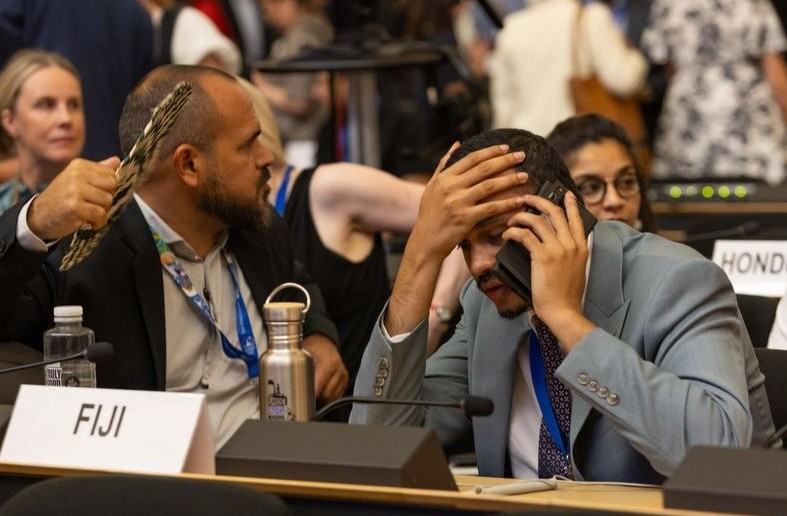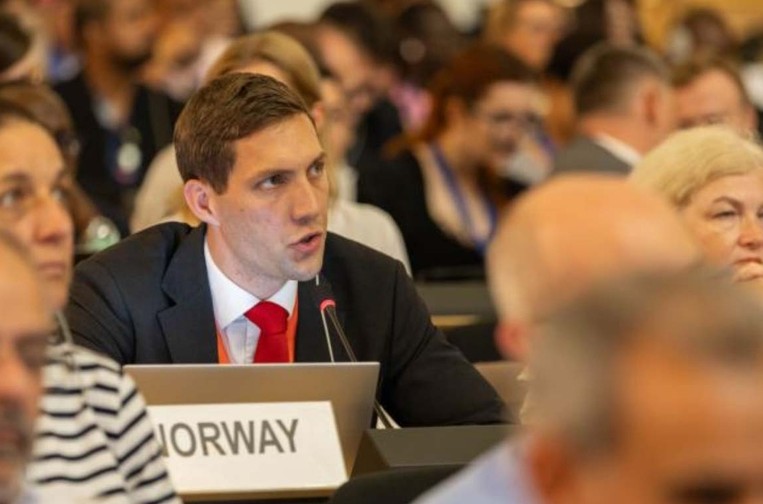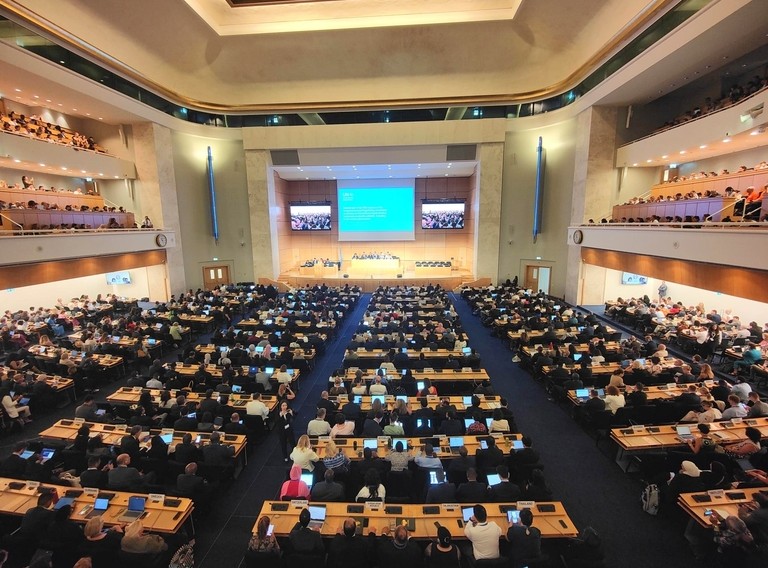Plastics treaty talks collapse; next steps unclear
main text
Plastics treaty talks collapse; next steps unclear

IISD/ENB - Kiara Worth
Delegates react to the suspension of the treaty talks in Geneva.
The plastics treaty talks ended Aug. 15 in Geneva without agreement, with countries unable to overcome differences on production limits, chemical toxicity and how to pay for the agreement.
As the talks at the United Nations's European headquarters collapsed after an all-night session that went past the Aug. 14 deadline, diplomats and observers expressed disappointment and said they would search for a way forward.
It was unclear what that path would be after nearly three years of talks among 180 nations.
The splits from earlier rounds remained. Oil-producing Middle East nations, the United States, Russia, India and some others lined up against production limits and for a treaty focused on recycling and waste management.
Opposite them, a coalition of 100 European, African and South American nations, along with Canada, Mexico, South Korea, Japan and small island states, pushed for a broader treaty that would discuss "sustainable" levels of production and consumption and include chemical health provisions.
Some countries and observers said that a majority of nations who favor a more ambitious deal should keep moving ahead and consider changing the talks to use voting to make decisions, rather than consensus.
"I am disappointed, and I am angry," said Agnès Pannier-Runacher, France's minister of ecological transition, biodiversity, forests, sea and fisheries. "I am disappointed because a handful of countries, guided by short-term financial interests rather than the health of their populations and the sustainability of their economies, blocked the adoption of an ambitious treaty against plastic pollution."
A group of 100 countries who back a stronger deal, the High Ambition Coalition, said the agreement needs to address the "unsustainable consumption and production of plastics" and include global measures on plastic products and chemicals in plastics, stronger finance provisions and the possibility of voting to resolve differences.

IISD/ENB - Kiara Worth
Andreas Bjelland Eriksen, minister of climate and environment of Norway.
"More than 100 countries have stood together to underline these key components of a treaty," said Andreas Bjelland Eriksen, minister of climate and environment of Norway and co-chair of the coalition. "We have shown great flexibility; and we have proposed and explored different approaches to a set of measures needed to achieve the outcomes that science tells us are necessary."
The talks ended after countries rejected two last minute drafts, including an Aug. 13 version that dropped production limits and chemical health language, and a second version released in the early morning hours Aug. 15 that some countries said was closer to agreement but not enough.
"The new text presented last night is indeed more balanced and constitutes more of a basis for negotiation," Pannier-Runacher said. "But too many points remain unresolved, too many points prevent us from having an effective tool against plastic pollution, which makes it impossible to conclude an agreement today."
"Recycling and waste management is useful but will never provide a genuine full response," she said. "Production and consumption levels currently are not sustainable."
Some observers pointed to sizable numbers of countries coalescing around stronger measures. The International Pollutants Elimination Network said 90 countries back a plan from Mexico and Switzerland to include global regulations on toxic chemicals in plastic products.
A World Wildlife Fund tracker pointed to more than 100 countries supporting global phaseouts of some products and chemicals, product design rules and measures to strengthen the treaty over time.
A coalition of plastics and chemical companies called the ending of the Geneva talks a missed opportunity.
Plastics industry groups have opposed including production limits and chemical toxicity provisions in the treaty, but said that countries have found common ground on other measures to improve recycling and expand access to waste management.
"Negotiators have already found common ground on critical elements that can form the backbone of an agreement to reduce plastic pollution, accelerate a circular economy, and expand waste collection to the 2.7 billion people who currently lack it," said Marco Mensink, council secretary of the International Council of Chemical Associations and a spokesperson for the Global Partners for Plastics Circularity.
"Our global coalition of plastics and chemical manufacturers remains committed to supporting a treaty that keeps plastics in the economy and out of the environment by advancing a circular economy—designing products for reuse and recycling, collecting them at end of life, and remaking them into new products," Mensink said. "Across every region, our members are investing in the infrastructure, technologies, and design changes needed to make plastics more reusable, recyclable, and less likely to become pollution."
The World Plastics Council said countries should focus on those common ground issues and avoid contentious topics.
"I would urge negotiators to focus on what unites us — building waste management capacity and the circular model we all aspire to — and to steer away from contentious issues that threaten the historic opportunity to reach an agreement to end plastic pollution," said Benny Mermans, WPC chairman and vice president of sustainability at resin maker CPChem.
A diplomat representing Saudi Arabia criticized the closed-door discussions overnight on Aug. 14 for talking about production, finance, plastics products and decision making but said the country was "deeply troubled" the talks did not give enough weight to recycling and waste management.
"The discussion centered around a certain avenue and a certain pathway and did not include recycling and waste management and the robustness that is required there," said Saudi diplomat Maria AlJishi.
The Business Coalition for a Global Plastics Treaty, a group of consumer brands and financial institutions, said it was disappointed but saw elements to build on in future talks.
"We are … encouraged by the increased clarity achieved through three years of negotiations … by the alignment among over 100 countries on the key elements — including phase-outs, product design, and extended producer responsibility," the coalition said.
The Geneva talks were the sixth round of negotiations and were designed to be the last.
The previous round in Busan, South Korea, in late 2024 also ended without agreement, but there was more of a sense that another negotiation session would be scheduled.
The next steps remain less clear this time. Speaking to reporters immediately after the session end Aug. 15, Inger Andersen, the head of the United Nations Environment Programme, noted a contentious world political environment outside the plastics talks.
"It is clear that we are living in an era of significant political complexity. We're living in a time of economic challenges and obviously multilateral complexity," she said. UNEP oversees the talks.

IISD/ENB - Kiara Worth
The plastics treaty talks ended Aug. 15 at UN offices in Geneva without an agreement, leaving next steps uncertain.
"It is critical that we take some time, first to sleep and then to reflect and then to regroup," she said. "I'm quite sure that member states will be discussing amongst themselves on the way forward."
She said that countries in the last stages of the Geneva round were laying out their "red lines" in more explicit ways and that could provide a way ahead.
"It is important that everyone takes time to reflect on what they have heard, because in the closed groups, in the contact groups, in the corridors of these halls, red lines have been mentioned for the first time in a true way which will enable deeper pathway seeking as we move ahead," she said.
She said the two to three year time frame set for the treaty was very short by international standards.
A closing statement from the U.N. said the negotiating committee agreed to resume talks at an undecided date and said that "countries clearly want to remain at the table."
Environmental groups called for countries that favor a stronger treaty to find another process outside of the current structure, which was launched under the United Nations Environment Assembly in late 2022.
"Countries that want a treaty must now leave this process and form a treaty of the willing," said David Azoulay, head of delegation for the Center for International Environmental Law. "And that process must include options for voting that deny the tyranny of consensus we have watched play out here."
Similarly, the World Wildlife Fund urged countries to move outside what is called the intergovernmental negotiating committee, or the UNEP process that has been administering the treaty.
"Continuing without any radical shift in the process, without giving proper weight to the demands of the majority would be futile," said Zaynab Sadan, WWF's global plastics policy lead. "Taking the treaty beyond the [international negotiation] process is the way forward for finally moving beyond the restraints of the low ambition minority, paving a way for a meaningful treaty."
* Edit : HANDLER
- PreviousAuto suppliers anticipate rough conditions in next six months 25.08.20
- NextA plan to strengthen Europe's chemical industry 25.07.20
